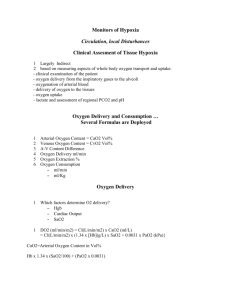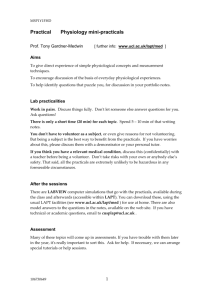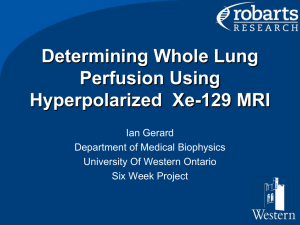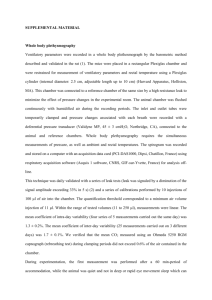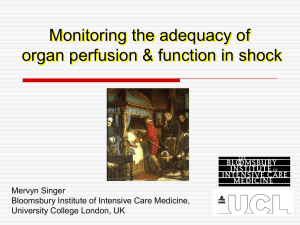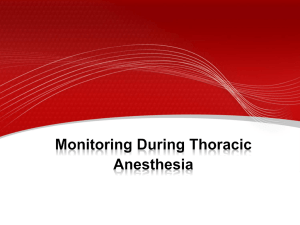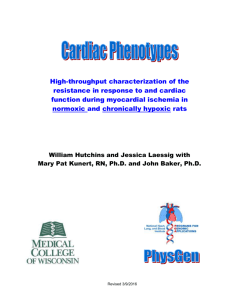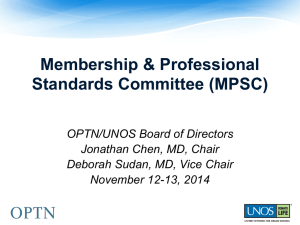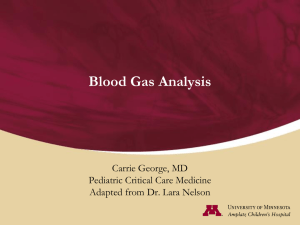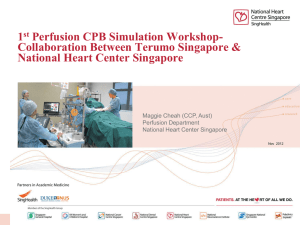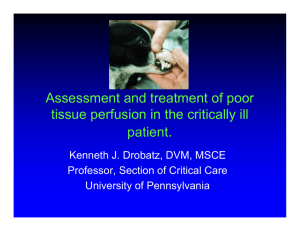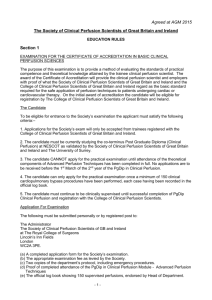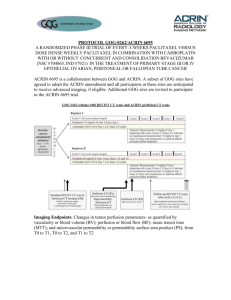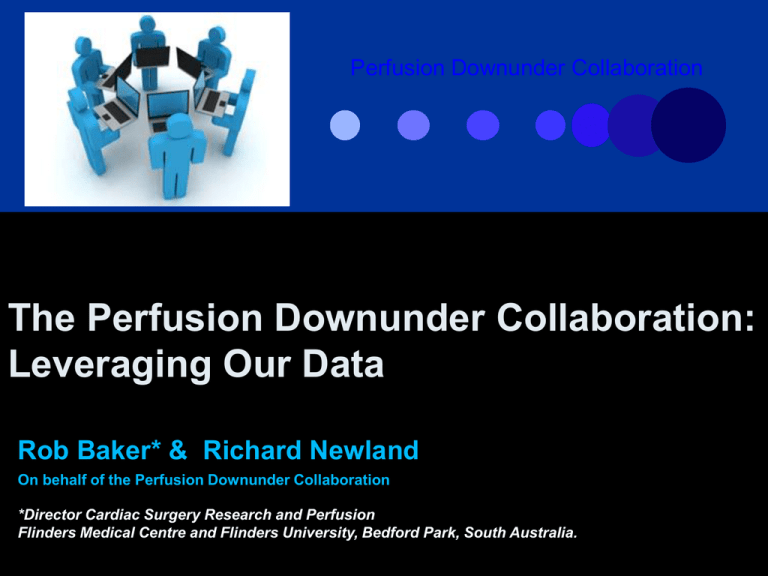
Perfusion Downunder Collaboration
The Perfusion Downunder Collaboration:
Leveraging Our Data
Rob Baker* & Richard Newland
On behalf of the Perfusion Downunder Collaboration
*Director Cardiac Surgery Research and Perfusion
Flinders Medical Centre and Flinders University, Bedford Park, South Australia.
COI’s / Disclosures
• Travel and Research support in the last 12
months
– Medtronic
– Cellplex Pty Ltd
– Terumo Corporation
Perfusion Downunder
Collaboration
A collaborative network of perfusion
and interested researchers, who share
the commitment to cooperation and
collaboration in the pursuit of
excellence in perfusion.
Who is the PDUC?
PDUC Mission Statement
To foster and grow high quality
research in the perfusion sciences
by the establishment and
maintenance of a prospective data
set on cardiac surgical procedures
performed in centres throughout
Australia and New Zealand.
Perfusion Downunder
Collaboration
Understand
and quantify
our practice
Quality
improvement
Research
PDU Collaborative Database
HLM software
(DMS or JOCAP)
PDU Database
PDU Transfer
Database
De-identified
Central PDU
Database
2007 - Current: Recruitment & Data
Dataset
•
(n=7769)
Total records imported
(April 2011)
294 after censor date
111 missing date of surgery
•
(n=7364)
Jan 2007 - Feb 2011
111 missing age
22 age <18
•
Adult isolated CABG/
Valve/ Valve + CABG
(n=5465)
Dataset
• Demography
– Age, Sex, Weight etc
• Clinical
– Urgency, Clinical history etc
• Perfusion and quality indicators
– Bypass time, management, monitoring etc
– Electronic data variables
• (continuous and calculated)
• Procedure
– Number of grafts, valve replacement etc
• Outcomes
– Length of stay, complications etc
Risk factors and
Demographics
Number of patients
PDUC ASCTS PDUC ASCTS PDUC ASCTS PDUC
2007-08 2007- 2008-09 2008-09 2009-10 2009- 2010-11
08*
10*
PDUC
Total
1191
2629
1286
2692
1530
2740
1458
5465
Risk Factors
%
%
%
%
%
%
%
%
Current Smoker
16
14
11
15
14
14
15
14
Diabetes
28
29
29
30
27
30
28
28
Hypertension
68
71
64
72
68
73
68
67
Cerebrovascular disease
9
13
10
13
10
14
10
10
Family history of heart
disease
35
40
34
36
36
Hypercholesterolaemia
63
63
65
62
63
Previous cardiac
intervention
17
19
17
21
19
21
18
18
Congestive heart failure
25
25
16
21
13
22
15
16
MI before surgery^
34
20
27
20
25
20
26
28
Male
74
75**
74
70
74
72
73
74
Risk Factors: Core Procedures
Postoperative outcomes
PDUC PDUC PDUC PDUC PDUC Total
2007-08 2008-09 2009-10 2010-11
%
%
%
%
%
Stroke
1.6
1.1
1.8
1.7
1.6
New renal failure
2.6
2
2.1
2.5
2.3
Myocardial infarction
2.2
1.7
1.8
1
1.6
Reoperation
7.6
4.6
5.5
7.1
6.1
Ventilation > 24 hrs
11.3
13.8
15.7
15.7
14.2
30 day mortality
2.7
3.4
1.4
2.4
2.4
We are interested in what is not in
other databases (ie Perfusion
variables) and relating practices to
outcomes:
Components of the Circuit
Pump Type
Venous Reservoir Type
Biopassive circuit coating
Circuit coating:type
Coated circuit use
Oxygenator coating
Monitoring
Cerebral oximetry
Blood gas monitoring
BIS monitoring
Clinical incidents
Near misses
Incidents
PIRS reports
Accidents reported to PIRS: 56.5%
Near misses reported to PIRS: 37%
Exposure to RBC transfusion
(Cummulative %)
23
Blood management utilisation
Overall
By site
ICU blood loss
1st 4 hours
(n=2890, 384 cases missing data)
Total
(introduced nov 2007. n=2259, 393 cases
missing data)
Continuous and Electronic data
•
Quality indicators
–
–
–
–
–
–
–
–
•
haemoglobin <70 g/dl
blood glucose > 10 mmol
arterial temperature >37C for >2 min
arterial pressure < 40 mmHg > 5 minutes
cardiac index < 1.6 l/min/m2 > 5 minutes
venous saturation < 60% > 5 minutes
pCO2 < 35 or > 45 mmHg
pO2 <100 mmHg
Multi-insitutional Level
Art P <40 mmHg >5 min
Percentage of Cases
35
30
25
20
15
10
5
0
1
2
3
4
5
6
7
8
Centre
4th Harvest
5th Harvest
Percentage of Cases
CI <1.6
2
l/min/m
>5 min
50
45
40
35
30
25
20
15
10
5
0
1
2
3
4
5
6
7
8
Centre
4th Harvest
5th Harvest
Defining benchmarking?
•
“Concept of using a structured method of
quality measurement and improvement”
•
“Process of measuring performance using
one or more specific indicators to compare
activity with others”
Methods - Benchmarks
• Quality Indicators
– Chosen
•
•
Evidence / guidelines
Consensus
– arterial outlet temperature > 37oC
– blood glucose < 4 or > 10 mmol/l
– pCO2 <35 or >45 mmHg
• Achievable Benchmarks of Care
–
Weissman et al 1999 J Eval Clin Pract 5;269-281
Calculating benchmarks with paired-mean method
•
Calculate adjusted performance fraction (APF)
APF = (x + 1)/(d + 2)
•
Rank centres in order of performance for a specific quality indicator
•
Create subset comprising top 10% best-performing centres, add
centres until a subset represents at least 10% of the entire dataset
is established
•
Calculate benchmark based on subset as follows:
Total number of patients in subset receiving recommended intervention
Total number of patients in subset
Weissman et al 1999 J Eval Clin Pract 5;269-281
Arterial pCO2 < 35 or > 45 mmHg
20.3%
Arterial pCO2 < 35 or > 45 mmHg
Arterial pCO2 < 35 or > 45 mmHg
Percentage of Patients
Arterial outlet temperature > 37oC
6.2%
Factors
Arterial outlet temperature > 37oC
Cummulative site performance
Thankyou

